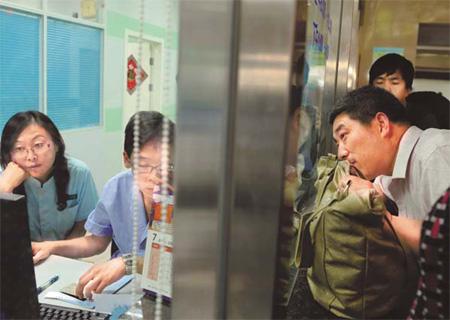
A man tries to make an appointment at Beijing Children's Hospital recently. A free hotline and medical website for appointments are to be introduced in July. [Photo/China Daily]
BEIJING - A free hotline and a medical website will be put into service in July to help patients to make appointments more easily with hospitals in Beijing, an official of the municipal health authority said on Monday.
Citizens will be able to register hospitals through the telephone number or the website, to be released next month, without paying extra registration fees, an official at Beijing Municipal Health Bureau, surnamed Ma, told China Daily.
As part of the healthcare reform, the appointment registration project started in September 2009 and has so far covered 35 percent of the hospitals in Beijing, but different hospitals have different hotline numbers and citizens must pay an extra 3 yuan (50 cents) if they dial the numbers to make appointments, Ma said.
From next month, 21 municipal hospitals will be part of a pilot program to receive patients' appointments in the new way and then it will be extended to the whole city, said Ma.
"The unified registration number and website will be easier to remember and more convenient for those who cannot come to hospitals to make appointments," Ma said.
The unified free registration hotline and website program had received support from many doctors and patients.
An operator working at the registration hotline center at Beijing Friendship Hospital, who did not want to be identified, said the program would ease the pressure on the registration department because fewer people would come to the hospital to make appointments as many of them will be able to do it from home.
"Registration online or through phone calls will be the trend in the future," said Peng Bibo, deputy director of the medical department at the General Hospital of Armed Police Forces.
"It helps to keep hospitals in good order and provide a better medical environment for patients."
Wei Yu, a 30-year-old patient, said she looked forward to the unified hotline, because she often became confused by the different phone numbers or website addresses of different hospitals.
However, some citizens and doctors expressed doubts about the efficiency of the new program.
Kou Fei, a Beijing resident who works at an educational company, thought the unified hotline and website will very likely bring unnecessary problems.
"I probably won't be able to register at the hospital I want, because the wire speed will be slow and the hotline may be busy because so many people will use them," she said.
Hao Weisheng, a doctor working in the outpatient department at the General Hospital of Armed Police Forces, has similar worries to Kou. According to Hao, the best way is to provide patients with more specific information on the respective hospital's websites.
"After all, different hospitals have different strengths," Hao said. "People can choose doctors or medical care then make appointments on different hospitals' websites instead of the unified one."





